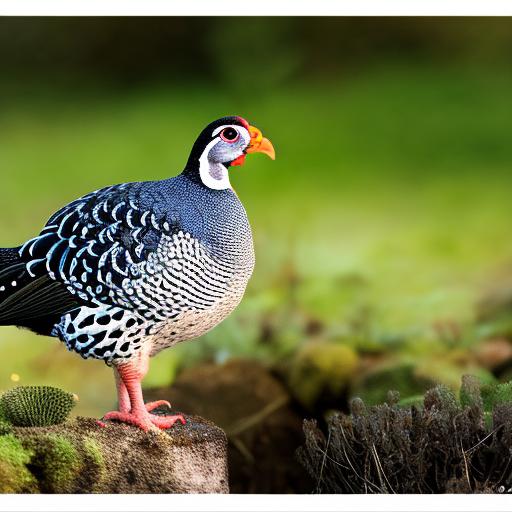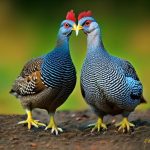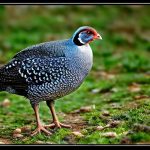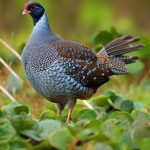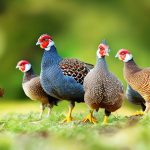Guinea fowl, also known as pintades, are increasingly popular as pets due to their unique personalities and low maintenance requirements. These birds are native to Africa but have been domesticated and are now commonly kept in backyard settings around the world. Guinea fowl are known for their distinctive appearance, with speckled feathers and a helmet-like crest on their heads. They are also valued for their ability to control pests such as ticks, flies, and even snakes, making them a valuable addition to any homestead or farm.
Guinea fowl are social birds that thrive in small flocks, so they are best kept in groups of at least four or five individuals. They are also highly vocal, with a range of calls that they use to communicate with each other and alert their owners to potential threats. While they are not as commonly kept as chickens or ducks, guinea fowl can make excellent pets for those who are willing to provide them with the proper care and attention. In this article, we will explore the various aspects of keeping guinea fowl as pets, including housing, feeding, health care, training, and common behavioral traits.
Key Takeaways
- Guinea fowl make unique and entertaining pets, known for their insect-eating abilities and loud calls.
- When choosing housing for guinea fowl, prioritize space, protection from predators, and access to fresh water and shade.
- Guinea fowl require a balanced diet of commercial game bird feed, supplemented with greens, insects, and grit.
- Regular health check-ups and vaccinations are essential for keeping guinea fowl healthy and disease-free.
- Socializing guinea fowl from a young age and using positive reinforcement can help in training them and reducing their natural skittishness.
Choosing the Right Housing for Guinea Fowl
When it comes to housing guinea fowl, there are a few key considerations to keep in mind. First and foremost, guinea fowl need a secure and predator-proof enclosure to keep them safe from potential threats such as foxes, raccoons, and birds of prey. The enclosure should also provide plenty of space for the birds to roam and forage, as guinea fowl are active and curious creatures that enjoy exploring their surroundings.
In addition to a secure enclosure, guinea fowl also require access to a sheltered area where they can roost at night and seek refuge from inclement weather. This can be provided in the form of a simple coop or shelter with roosting bars and nesting boxes. It’s important to keep the bedding in the coop clean and dry to prevent the birds from developing respiratory issues or foot problems. Additionally, providing perches and branches for the guinea fowl to roost on during the day can help keep them entertained and provide them with opportunities for exercise. Overall, the key to providing suitable housing for guinea fowl is to prioritize their safety and comfort while allowing them plenty of space to exhibit their natural behaviors.
Feeding and Nutrition for Guinea Fowl
Guinea fowl are omnivorous birds that have a varied diet consisting of seeds, grains, insects, and small invertebrates. In a domestic setting, they can be fed a commercial game bird feed or poultry feed supplemented with fresh fruits and vegetables, as well as access to insects and other protein sources found in the environment. It’s important to provide access to clean water at all times, as guinea fowl can be prone to dehydration, especially in hot weather.
In addition to their basic dietary needs, guinea fowl also benefit from access to grit or small stones, which they use to help grind up their food in their gizzards. This is particularly important if they are not able to free-range and find their own grit naturally. It’s also worth noting that guinea fowl are adept foragers and enjoy spending time searching for insects and other tasty treats in the grass and soil. Providing them with opportunities to forage can help keep them mentally stimulated and physically active, which is important for their overall well-being.
Health and Veterinary Care for Guinea Fowl
Like any pet, guinea fowl require regular monitoring of their health and well-being to ensure they remain happy and healthy. It’s important to keep an eye on their overall condition, including their weight, feather quality, and behavior. Any changes in these areas could be indicative of an underlying health issue that requires attention.
In terms of veterinary care, finding a veterinarian with experience in treating poultry or exotic birds is essential for keeping guinea fowl healthy. Regular check-ups can help catch any potential health problems early on, and a knowledgeable vet can provide guidance on preventative care measures such as vaccinations and parasite control. Additionally, it’s important to keep the birds’ living environment clean and free from potential sources of disease or parasites.
Common health issues that can affect guinea fowl include respiratory infections, parasites such as mites or lice, and injuries from predators or accidents. Being proactive about monitoring the birds’ health and seeking veterinary care when needed can help ensure that they live long and healthy lives as beloved pets.
Training and Socializing Guinea Fowl
Guinea fowl are intelligent birds that can be trained to some extent, particularly when it comes to basic commands and routines. Positive reinforcement training methods can be used to teach guinea fowl to come when called or to recognize certain cues for feeding time or other activities. It’s important to be patient and consistent when training guinea fowl, as they can be somewhat independent-minded and may take time to learn new behaviors.
Socializing guinea fowl is also an important aspect of keeping them as pets. These birds are naturally social creatures that thrive in the company of their own kind, so it’s best to keep them in small groups rather than as solitary individuals. They can also form strong bonds with their human caregivers if given the opportunity for positive interactions from a young age.
Spending time with your guinea fowl, talking to them, and offering them treats can help build trust and strengthen your bond with them. However, it’s important to respect their boundaries and allow them to approach you on their own terms rather than forcing interactions. With patience and gentle handling, guinea fowl can become friendly and sociable pets that enjoy spending time with their human companions.
Common Behavioral Traits of Guinea Fowl
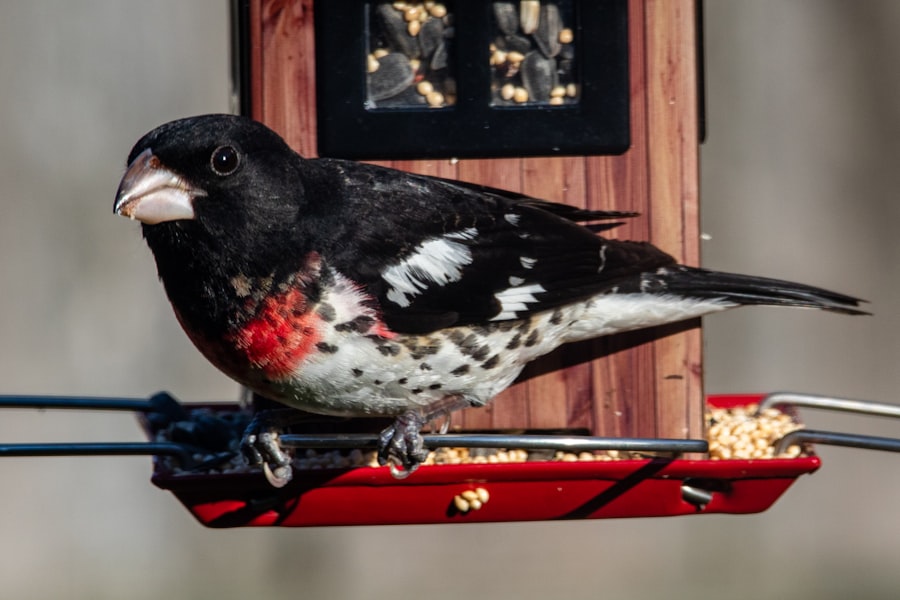
Guinea fowl are known for their unique behavioral traits that make them both entertaining and endearing pets. One of their most distinctive behaviors is their vocalizations, which can range from soft chirps to loud calls that can be heard from a distance. Guinea fowl use their calls to communicate with each other, alerting the flock to potential threats or signaling their location.
In addition to their vocalizations, guinea fowl are also known for their curious and active nature. They enjoy exploring their surroundings and will eagerly investigate new objects or changes in their environment. This natural curiosity can make them fun pets to observe and interact with, as they often display playful behaviors such as dust bathing or chasing after insects.
Guinea fowl are also known for their strong flocking instincts, which can make them somewhat skittish around unfamiliar people or animals. However, with time and patience, they can become more comfortable with human interaction and may even seek out attention from their caregivers. Overall, guinea fowl have a range of endearing behavioral traits that make them fascinating pets for those who appreciate their unique personalities.
Conclusion and Tips for Keeping Guinea Fowl as Pets
In conclusion, keeping guinea fowl as pets can be a rewarding experience for those who are willing to provide them with the proper care and attention. From choosing suitable housing to providing a nutritious diet and veterinary care, there are several key aspects to consider when keeping guinea fowl as pets. Additionally, understanding their behavioral traits and taking the time to train and socialize them can help ensure that they thrive in a domestic setting.
For those considering adding guinea fowl to their family, it’s important to research their needs thoroughly and ensure that you have the time and resources to meet those needs. Providing a safe and stimulating environment for guinea fowl, along with regular veterinary care and positive interactions, can help ensure that they live happy and healthy lives as beloved pets. With the right approach, guinea fowl can make delightful additions to any household or farm, bringing joy with their unique personalities and charming behaviors.
If you’re considering keeping guinea fowl as pets, you may also be interested in learning about the dietary needs of geese. Poultry Wizard has a helpful article on whether geese can eat chicken feed, which provides valuable insights for anyone looking to raise multiple types of poultry. Check out the article here to ensure that your feathered friends are getting the nutrition they need.
FAQs
What are guinea fowl?
Guinea fowl are a type of bird that are native to Africa. They are known for their distinctive spotted feathers and loud, chattering calls.
Can guinea fowl be kept as pets?
Yes, guinea fowl can be kept as pets. They are often kept for their pest control abilities, as they eat insects and ticks. They can also be kept for their unique appearance and entertaining behavior.
What do guinea fowl eat?
Guinea fowl are omnivores and eat a diet that consists of seeds, insects, small reptiles, and plants. They can also be given commercial poultry feed.
Do guinea fowl require special housing?
Guinea fowl require a secure coop or housing to protect them from predators. They also need access to a large outdoor area to roam and forage.
Are guinea fowl noisy?
Yes, guinea fowl are known for being noisy birds. They have a loud, chattering call that can be heard from a distance.
Do guinea fowl need companions?
Guinea fowl are social birds and do best when kept in small flocks. They can be kept with other guinea fowl or with chickens and other poultry.
Are guinea fowl easy to care for?
Guinea fowl require some special care, such as protection from predators and access to a varied diet. However, they are generally hardy birds and can be relatively low-maintenance pets.
Meet Walter, the feathered-friend fanatic of Florida! Nestled in the sunshine state, Walter struts through life with his feathered companions, clucking his way to happiness. With a coop that’s fancier than a five-star hotel, he’s the Don Juan of the chicken world. When he’s not teaching his hens to do the cha-cha, you’ll find him in a heated debate with his prized rooster, Sir Clucks-a-Lot. Walter’s poultry passion is no yolk; he’s the sunny-side-up guy you never knew you needed in your flock of friends!

